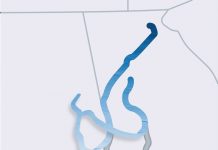
I remember a house.
It was on the northwest tip of Lake Lanier, only 35 minutes from my hometown of Roswell, but my family could almost feel civilization slipping away along the drive up. Shopping centers gave way to ramshackle gas stations, which in turn gave way to farmland. We rolled into the drive on gravel.
Once my dad was stopped while jogging by a local deputy sheriff. “Son,” said the sheriff, “what are you doing?”
“Running,” my dad said.
“I can see that,” said the sheriff. “What are you running from?”
Lake house evokes glamour, but ours was simple: one open floor with two small bedrooms, an upstairs loft, and a back porch. I remember racing to the water and jumping in, ignoring the splinter danger of our wooden dock. I remember pulling weeds, sweating, and learning firsthand the family adage, “If you didn’t get dirty, you didn’t do the job right.” I remember cookouts and picnics, midnight bedtimes and fresh air, dogs and kids running free. Without city light pollution, at night I could gaze past fireflies and see stars.
When my grandparents sold the house, I was almost 17 years old. High schoolers want to feel like adults, but I felt as crushed as a child that day.
My family saw it coming around the time I was born. When my grandparents and great-grandparents built the house in 1979, there were no grocery stores for miles—and only a single tiny restaurant. But in the early 1990s, a Kroger opened. Then a pizza delivery place. And in 1996, the North Georgia Premium Outlets. What greater sign of impending civilization is there than a mall?
Development took its toll. My dad would get sinus infections from swimming in the water; we’d all have to shower after getting out to avoid being sick. We were at the mouth of Thompson Creek, and according to experts, creeks are more susceptible than lakes to storm runoffs carrying oils and metals from newly paved roads. Favorite pastimes fell by the wayside as larger boats arrived: The water became too choppy for kayaking or waterskiing, too loud for peaceful lounging on the dock. The 35-minute drive stretched to 90 minutes in traffic.
This is no exposé: Sally Bethea, founding director of environmental organization Chattahoochee Riverkeeper, assures me the lake is healthy—for now. “Lanier isn’t a highly polluted lake, but it is at the point where legal measures need to be taken to make sure it stays high-quality water,” she says.
I haven’t been back since the property was sold; I’d rather remember it the way I left it. Days before the deed transferred, my dad picked me up from school with one of our two Weimaraners in the car. “We’re going to the lake house,” he said.
I circled the house one last time. I stood in the garden, looking down at small wire fences that had once towered over me. I walked toward the dock and sat in the sand. Surprisingly, there were no Jet Skis, and the only sounds were those from nature. My dog appeared beside me. I put my arm around him, and together, we watched the sun set.
Cameron Albert-Deitch is an assistant editor at Inc. magazine.
This article originally appeared in our Summer 2016 issue of Atlanta Magazine’s HOME.













